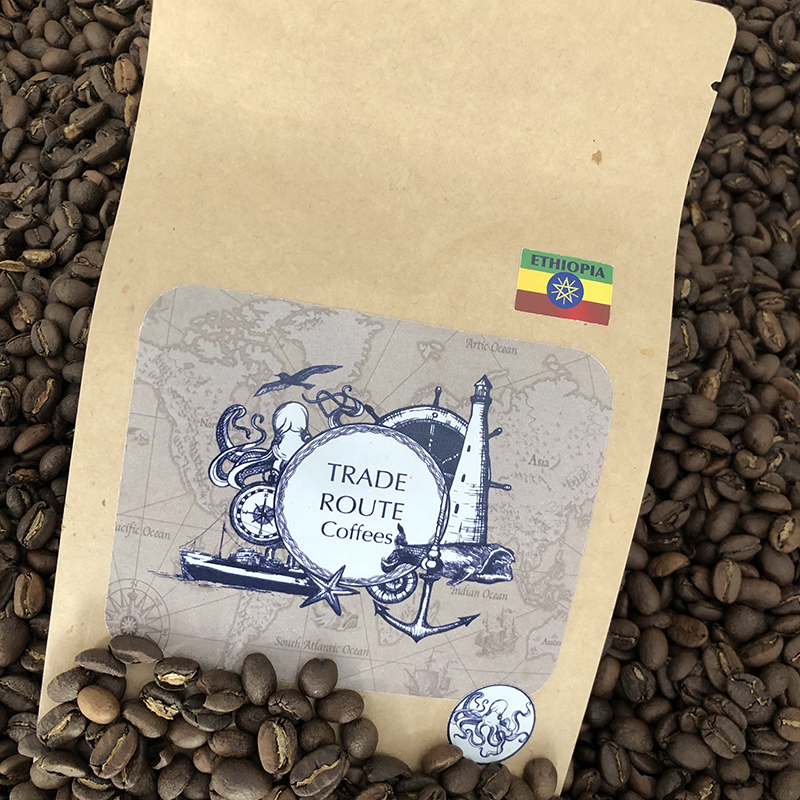

Ethiopia, often regarded as the birthplace of coffee, boasts a diverse and vibrant coffee culture that dates back centuries. Ethiopian coffee single origin medium roast hold a special place in the hearts of coffee connoisseurs worldwide, thanks to their unique flavors, rich history, and cultural significance. In this article, we'll take a closer look at the fascinating world of Ethiopian coffee, exploring their origins, characteristics, and much more.


The story of Ethiopian coffee begins in the ancient forests of the Ethiopian highlands, where legend has it that a goat herder named Kaldi discovered the energizing effects of coffee beans after noticing his goats became lively after eating them. This discovery sparked the cultivation of coffee in Ethiopia, leading to the establishment of coffee trade routes and the development of elaborate coffee ceremonies that remain an integral part of Ethiopian culture to this day.
Ethiopian coffee blends come in a variety of forms, ranging from single-origin beans to carefully crafted blends that combine beans from different regions. Single-origin coffees highlight the unique characteristics of beans from specific growing regions, while blended coffees offer a harmonious balance of flavors and profiles. Popular Ethiopian coffee blends include the famous Yirgacheffe, Sidamo, and Harrar blends, each known for its distinctive taste and aroma.
Ethiopia is home to several distinct coffee-growing regions, each with its own microclimates and terroirs that influence the flavor and profile of the coffee grown there. Some of the major coffee-producing regions in Ethiopia include Yirgacheffe, Sidamo, Harrar, and Limu. Each region is known for producing coffees with unique flavor profiles, ranging from fruity and floral to earthy and spicy.
Coffee harvesting in Ethiopia often involves traditional methods, with farmers hand-picking ripe cherries from the coffee trees during the harvest season. Once harvested, the cherries are processed using either the wet or dry method. The wet method involves removing the pulp and mucilage from the cherries before drying them, while the dry method involves drying the cherries with the pulp intact. Each method imparts different flavors and characteristics to the final cup of coffee.
Ethiopian coffee blends are renowned for their complex flavors and aromatic profiles, which are influenced by factors such as altitude, soil composition, and processing method. Ethiopian coffees often exhibit floral, fruity, and wine-like flavors, with hints of citrus, berry, and spice. The high altitude and fertile soil of the Ethiopian highlands contribute to the exceptional quality and diversity of Ethiopian coffee blends, making them highly sought after by coffee enthusiasts around the world.


In recent years, there has been a growing emphasis on sustainability in the Ethiopian coffee industry, with many farmers adopting environmentally friendly farming practices such as agroforestry and organic farming. Additionally, there has been a push for fair trade and ethical sourcing practices to ensure that coffee farmers receive fair compensation for their labor and that environmental resources are preserved for future generations.
Ethiopia is one of the world's leading coffee exporters, with Ethiopian coffee blends enjoying a strong reputation in the global market. Ethiopian coffees are prized for their exceptional quality, unique flavors, and cultural significance, making them a favorite among coffee roasters and consumers alike. In recent years, there has been a growing demand for Ethiopian specialty coffees, driven by increasing consumer interest in traceability, sustainability, and premium coffee experiences.
Ethiopia is home to several well-known coffee brands that have gained international recognition for their quality and authenticity. Brands like Yirgacheffe, Sidamo, and Harrar are synonymous with Ethiopian coffee excellence, offering a wide range of single-origin and blended coffees to suit every taste and preference. These brands play a vital role in promoting Ethiopian coffee culture and showcasing the diversity of flavors that the country has to offer.
Like all coffee, Ethiopian coffee blends contain antioxidants and other bioactive compounds that may offer a range of health benefits when consumed in moderation. Studies have shown that moderate coffee consumption may be linked to a reduced risk of certain diseases, improved cognitive function, and increased longevity. Ethiopian coffee, in particular, is prized for its rich antioxidant content and potential health-promoting properties.
Coffee holds a special place in Ethiopian culture, serving as a symbol of hospitality, friendship, and community. Traditional Ethiopian coffee ceremonies are elaborate affairs that involve roasting, grinding, and brewing coffee beans in front of guests, with each step performed with care and reverence. Coffee is often served alongside traditional snacks and sweets, creating a warm and welcoming atmosphere for guests to enjoy.
Despite its success, the Ethiopian coffee industry faces several challenges that threaten its sustainability and growth. Economic and social issues such as poverty, lack of access to education and healthcare, and inadequate infrastructure present significant barriers to the prosperity of coffee farmers in Ethiopia. Additionally, climate change poses a serious threat to coffee production, with rising temperatures and unpredictable weather patterns affecting yields and quality.
Despite these challenges, the future looks promising for Ethiopian coffee. Advances in farming technology, sustainable practices, and market access offer hope for increased productivity and resilience in the face of climate change and economic hardship. Additionally, growing consumer demand for high-quality, ethically sourced coffees presents new opportunities for Ethiopian coffee producers to thrive in the global market and improve the livelihoods of coffee farmers across the country.
When purchasing Ethiopian coffee blends, there are a few things to keep in mind to ensure you're getting the best quality beans. Look for reputable brands and suppliers that prioritize quality, sustainability, and fair trade practices. Consider trying different varieties and processing methods to discover your favorite flavors and profiles. And don't be afraid to ask questions about where and how the coffee was grown, as transparency and traceability are essential factors for ensuring the authenticity and integrity of Ethiopian coffee.

Ethiopian coffee blends represent the rich heritage, diverse flavors, and vibrant culture of the birthplace of coffee. From the ancient forests of the Ethiopian highlands to the bustling coffee markets of Addis Ababa, Ethiopian coffee continues to captivate the world with its exceptional quality, unique flavors, and timeless traditions. Whether you're savoring a cup of freshly brewed Ethiopian coffee at home or experiencing a traditional coffee ceremony in Ethiopia, you're tasting a piece of history and culture that has been cherished for centuries.
Ethiopian coffee is known for its complex flavors, floral aromas, and diverse profiles, thanks to the country's unique terroir and processing methods.
While single-origin coffees are common in Ethiopia, many blends combine beans from different regions to create a harmonious balance of flavors and characteristics.
Some well-known Ethiopian coffee brands include Yirgacheffe, Sidamo, and Harrar, each known for their exceptional quality and distinctive flavor profiles.
Like all coffee, Ethiopian coffee blends contain antioxidants and other bioactive compounds that may offer health benefits, including improved cognitive function and reduced risk of certain diseases.
Trade Route Coffees sells an enchanting medium roast single origin Ethiopian Sidamo coffee. We have packs of 250g or 1kg available in beans or grounded.
Find our products here.
